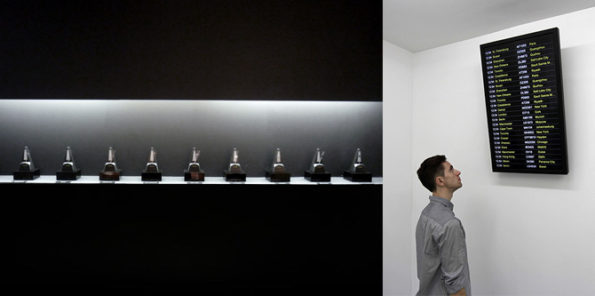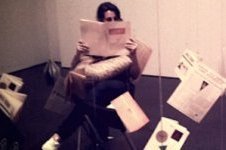Search
To search for an exact match, type the word or phrase you want in quotation marks.
A*DESK has been offering since 2002 contents about criticism and contemporary art. A*DESK has become consolidated thanks to all those who have believed in the project, all those who have followed us, debating, participating and collaborating. Many people have collaborated with A*DESK, and continue to do so. Their efforts, knowledge and belief in the project are what make it grow internationally. At A*DESK we have also generated work for over one hundred professionals in culture, from small collaborations with reviews and classes, to more prolonged and intense collaborations.
At A*DESK we believe in the need for free and universal access to culture and knowledge. We want to carry on being independent, remaining open to more ideas and opinions. If you believe in A*DESK, we need your backing to be able to continue. You can now participate in the project by supporting it. You can choose how much you want to contribute to the project.
You can decide how much you want to bring to the project.

The statistics of web use confirm it is unlikely you will dedicate more than 4 minutes and 30 seconds to reading this article. So I should measure my words well, seek a precise terminology and synthesize the right ideas, as I have only around 7000 characters. Not one more, and if possible, a couple less. But as if that wasn’t enough, no doubt at this precise moment you are in front of your computer screen (mobile phone or tablet) with five or more windows open at the same time, the odd message from Whatsapp or messenger waiting to be checked, an alert reminding you a new email has just arrived in your mailbox, while Facebook endeavours to catch your eye so that you update your new notifications. In the meantime in your head, in this small lapse of time, you will have archived an interminable list of pending tasks, which are plotting a mutiny so as to regain your attention. At present, as Juan Martín Prada describes, at we live as individuals submerged in a vortex of “permanent thoughtlessness of discontinued studies and ruptures”. An authentic fragmentation of time, in our permanent state of connection on a global scale, we are called upon to react instantaneously. Not wanting to not arrive on time, we act inopportunely and “already” it will be too late.
Pau Waelder in his latest exhibition Real Time. Art en temps real, proposes a reflection on this contemporary immediacy. On the anxiety of forming part of a present that is no longer our own so much as as it is broken up into the multiplicity of “nows” described by the mass media or social networks. For this he uses the works of 16 artists who share the particularity of constantly updating themselves, remaining in constant transformation. From the pressing rhythm of the ten metronomes of Varvara Guljajeva and Mar Canet, their hasty movements marked by social activity in real time in the form of tweets, posts, and likes from different cities, to the information panel by Martin John Callanan which reflects the crazy maelstrom of airplanes taking off on internationally (a whirlwind that on average leaves 400.000 travellers suspended in the air all across the globe), each one of the pieces exhibited in the show at Arts Santa Monica calls for time from the viewer. Time to meditate on time, because there is no mechanism as efficient as one that manages to go unnoticed. Indeed, something should concern us when the CCCB also dedicates its cycle Barcelona Debate 2016 to this question.
For to achieve a vulnerable society there is no better recipe than to add a condition of chronic uncertainty, or the unbearable pressure of a headlong pace. Zygmunt Bauman has been denouncing it for years: “Now «progress» represents the threat of a relentless and inescapable change that instead of auguring peace and respite portends nothing but continuous crisis and strain and forbids a moment of rest. Progress has turned into a sort of endless and uninterrupted game of musical chairs in which a moment of inattention results in irreversible defeat and irrevocable exclusion. Instead of great expectations and sweet dreams “progress” invokes insomnia full of nightmares in which one dreams of “being left behind”, missing the boat, or falling out of the window of a fast accelerating car.“[[Bauman, Zygmunt: “Tiempos Líquidos. Vivir en una época de incertidumbre”. Barcelona: Tusquets Editores, 2007. (p. 21)]].
Citizens are urged to take advantage of the last hundredth of a second. We must become efficient, multi-tasking individuals in the productive period, living a new atomised Carpe Diem in moments of leisure. The final aim is none other than to occupy each second of the human mind. While the different governments stumble around, ad hoc, from one crisis management campaign to another and one set of emergency measures to another. [[ Bauman, Zygmunt: “Tiempos Líquidos. Vivir en una época de incertidumbre”. Barcelona: Tusquets Editores, 2007. (p.40)]]. In the face of the anxiety and vertigo produced by an untrustworthy future, we allow ourselves to be sucked into a vicious circle of speed, distraction, and fear. We seek respite in discontinuities, in the spectacles of precipitous rhythms and their anaesthetising effects that offer us a brief moment of entertaining respite. A forging ahead traditionally taken advantage of by the media and which is intensified today in a virtual reality stuffed with images, videos, gifts, posts, and appointments. This production is already far greater than one any human being can assume or consume, one G. Chatonsky confronts us with, in his virtual group Capture. As Byung Chul Han argues in El aroma del tiempo. Un ensayo filosófico sobre el arte de demorarse, the morass of events and endless piles of information at present favour a multiplicity of experiences yet they submerge us in an empty time, characterised by an endless sporadic presences. The background cause is none other than the impossibility of any contemplative delay that allows us to access even the most minimal gravitation towards meaning.
No one is capable of predicting up to what point as people we will be able to resist this uncontrolled acceleration. What seems sure is that in a world perceived as increasingly more treacherous, the stressed and threatened subjects instead of acting freely or with due consideration, have passed in their majority simply to reacting to one event or another, without any possibility for long term plans, and heeding the dangerous motto of “every man for himself” that leaves little room for solidarity. A perfect breeding ground for profit that enables the cruellest forms of capitalism and liberalism to maintain and amplify their control.
But within the ambit of information, along with the critical System of Real Time (hard real-time), in which just one late response to an external event can have fatal consequences, there also coexists the option of a System of Acritical Real Time (soft real-time) in which delays are tolerated. Waelder’s exhibition far from being technophobic or dystopic shows us there is nothing more relative than time. Alternatives, like Katie Paterson’s non-terrestrial watches, are possible and ultimately it is comforting to know that the subject comes from way back. As Seneca wrote: “Nothing important, not the art of speaking, nor the liberal arts, can be done by a busy person, since a divided spirit takes nothing in deeply but spits everything back out as it had been stuffed in. Nothing is less important for a busy man than living… But living well must be the study of a lifetime…”[[Séneca, Lucio Anneo: “Sobre la brevedad de la vida, el ocio y la felicidad”. Barcelona: Acantilado 2013. (pág 40)]].

Those who know Amaia well, call her affectionately “la contreras”. For she spends hours, as if she has time to spare, debating, thinking and rethinking, analysing, deducing, responding…There are even those how have caught her in fraganti disagreeing with her pencil, in the margins of the pages, with the author of this book that by chance has landed in her hands. It was just a question of time before she ended up writing her own reflections in the hope that at some point somebody would read her ruminations, pencil in hand.
"A desk is a dangerous place from which to watch the world" (John Le Carré)